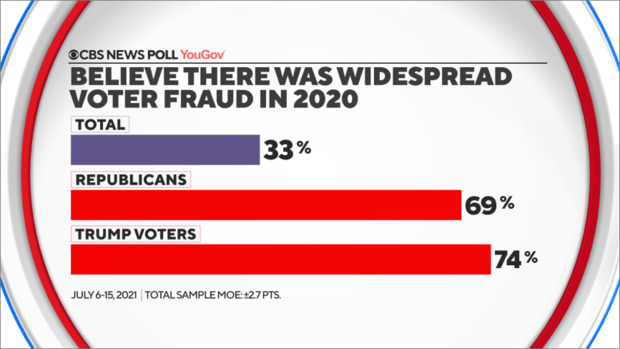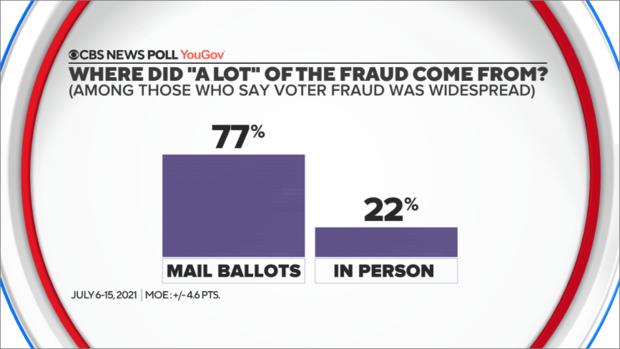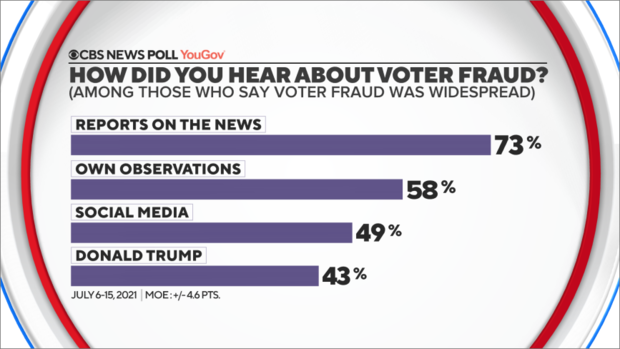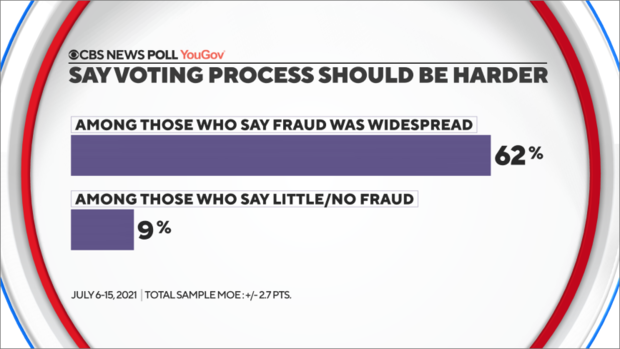CBS News analysis: What drives Republican and Trump voters’ belief in widespread voter fraud?
Most Americans don’t think there was widespread fraud in 2020, but ever since Joe Biden won, most Republicans say there was. This is connected to the push for further voting restrictions in some states, where making voting easier is seen as giving Democrats an advantage.
A closer look at why some still endorse the fraud claim and what specifically Republicans claim happened — despite the absence of actual evidence — shows a strong link to partisan politics. Republicans say fraud predominantly took place in cities and communities that vote Democratic, but much less so in the suburban and rural areas where many Republicans live. They also say it stemmed from mail ballots, which former President Trump long railed against, and which favored Democrats in many places. Meanwhile, most say ballots were counted properly in the states Mr. Trump won.
Moreover, we see the continuing strong influence of the former president’s words, with many saying they believe it because they heard it from him, as well as social media and selected news sources.
Where do people say fraud occurred?
Those who think there was widespread fraud in 2020 believe more of it occurred in communities that vote Democratic than in those that vote Republican. Seven in 10 attribute “a lot” of fraud to major cities and urban areas (which vote mostly Democratic), compared to 22% for suburbs (which are more competitive) and 14% in rural areas (which vote mostly Republican).
And views follow a similar pattern in relation to constituent voter groups. People who perceive widespread election fraud and irregularities attribute more of it to Black communities (a group that largely votes Democratic) than White communities (a group that largely votes Republican).
Views on voter fraud also differ with regard to how ballots were cast, not just where they were cast. More than three in four of those who believe in widespread fraud attribute a lot of it to ballots cast by mail, a method used disproportionately by voters of color and criticized repeatedly by former President Trump. Among our validated voters in 2020, for instance, voters of color are over 10 points likelier than White voters to have cast their ballot by mail.
And then there’s the political lens. Most of those who believe the election was marred by voter fraud and irregularities express at least some confidence that votes in states Mr. Trump won were counted properly, but when it comes to states Biden won, they are not “not at all confident” — only 10% are confident these votes were counted properly.
How did people hear about voter fraud?
When those who say there was widespread fraud are asked where they heard about it, 43% cite Donald Trump, who has continued to make baseless accusations of fraud since leaving office. More, 58%, cite their own personal observations. This is particularly the case among those who say they are not confident that the votes in their states were recorded and counted properly.
The source mentioned most often, by seven in 10, is “reports on the news.”
While opinions on voter fraud are mostly related to partisanship and support for Donald Trump, the news sources one regularly uses impacts views within these groups.
Trump voters who report regularly watching conservative leaning cable channels, like FOX News, OANN, or Newsmax, are particularly likely to claim fraud. Eight in 10 in this group say voter fraud was widespread, compared to two-thirds of other Trump voters.
Fraud and views of the voting process
Perceptions of fraud are very much connected to support for adding further restrictions to the voting process, something many states are considering. Among those who claim widespread fraud, six in 10 want voting made harder, compared to just one in 10 among those who say there was little or no voter fraud. Making voting harder is a minority view across the country, with just 27% of Americans saying they would like to see that happen.
Trump voters and Republicans who endorse the widespread fraud claim are also likelier than others in their party to say that making voting easier would advantage Democrats electorally.
Research on the issue of fraud is unequivocal: there is little to no evidence of voter fraud in recent U.S. elections, with most conspiracy theories about 2020 thoroughly debunked. U.S. courts ultimately rejected about 70 legal challenges to the election, according to the Stanford-MIT Healthy Elections Project. Moreover, methodologically rigorous studies find that double voting, non-citizen voting, and ballots cast on behalf of the deceased just don’t happen much if at all — the estimated prevalence is often statistically indistinguishable from zero.
This is part of a series of reports from a new CBS News study on America’s elections and voting process. The study is based on several data sources: a national survey, voter file data, and certified election results. The survey includes an oversample of over 2,000 validated voters who were matched to voter files confirming their vote history. We also reference academic work and data journalism by other researchers on voting rights and election administration.
The survey was conducted by YouGov using a nationally representative sample of 2,664 U.S. residents interviewed between July 6-15, 2021. Of the 2,065 self-reported voters in the sample, 2,023 were matched to voter files and confirmed as having voted. The sample was weighted according to gender, age, race and education based on the American Community Survey, conducted by the U.S. Bureau of the Census, as well as the 2020 presidential vote and registration status. The margin of error is ±2.7 points for the total sample.








